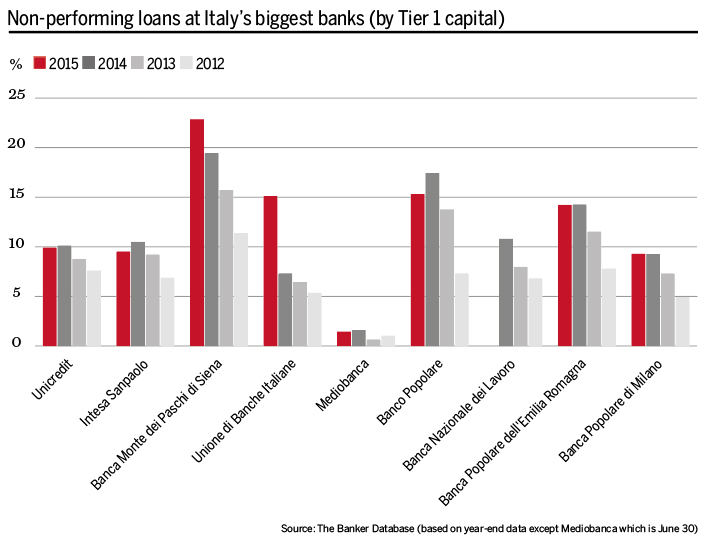Non-performing loans are causing major headaches for Monte dei Paschi di Siena and UBI Banca, but other Italian banks are faring better
The latest round of EU-wide stress tests have put Italian banks’ non-performing loans (NPL) in the spotlight yet again. But the Banker data paints a more nuanced picture.
The nation’s oldest, and most troubled, lender Monte dei Paschi di Siena fared the worst in the European Banking Authority’s (EBA) examination. Of the 51 banks tested, it is the only one to face the prospect of its capital being wiped out in a severe macroeconomic scenario. In a statement commenting on the results the bank recognised that its large stock of NPLs ‘decisively contributes’ to its low rating which, in turn, affects its funding costs during times of stress.
Percentage wise, Monte dei Paschi’s NPLs at the end of 2015 (22.84%) had more than doubled since 2012 (11.35%). But Unione di Banche Italiane (UBI Banca) – the country’s fourth biggest lender – also warrants some attention; its NPLs soared from 7.3% in its 2014 results to 15.1% at the end of last year.
Taking these two out of the equation, NPLs at Italy’s biggest lenders have seen a small improvement, after peaking in 2014 following year-on-year increases. Unicredit – the country’s only GSIB [global systemically important bank] and Intesa Sanpaolo have exhibited similar levels since 2012, while investment bank Mediobanca has dodged the national NPL problem.
A number of private and public sector securitisation-based initiatives could led to a drastic improvement in Italian banks’ 2016 figures. Earlier this year, Banca Carige joined the Pillarstone platform set up by KKR, Unicredit and Intesa which restructures or sells to investors NPLs from banks’ balance sheets. In February, the Renzi government launched its so-called GACs scheme, by which it guarantee the senior tranche of securitised NPLs sold into the markets.



